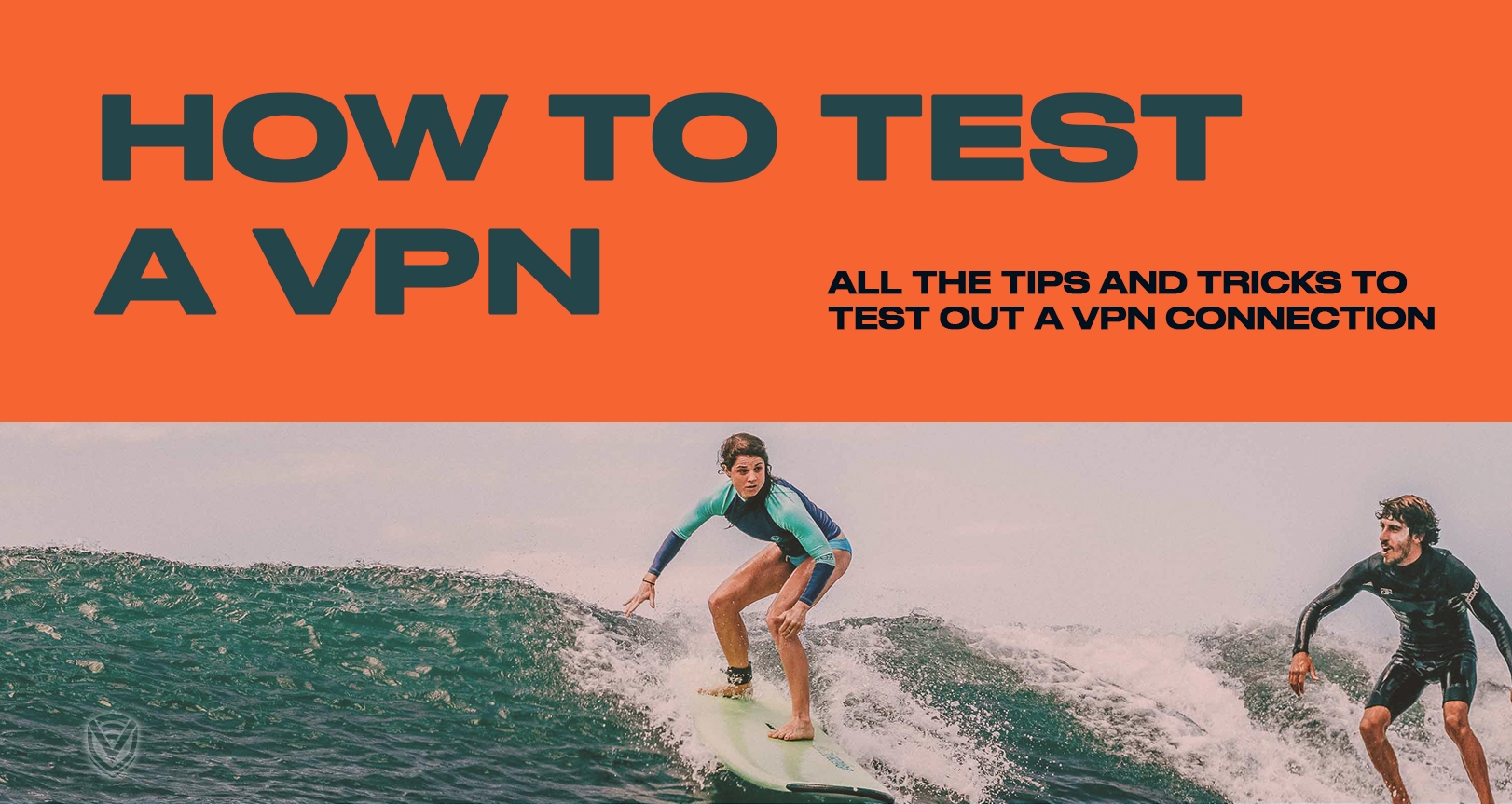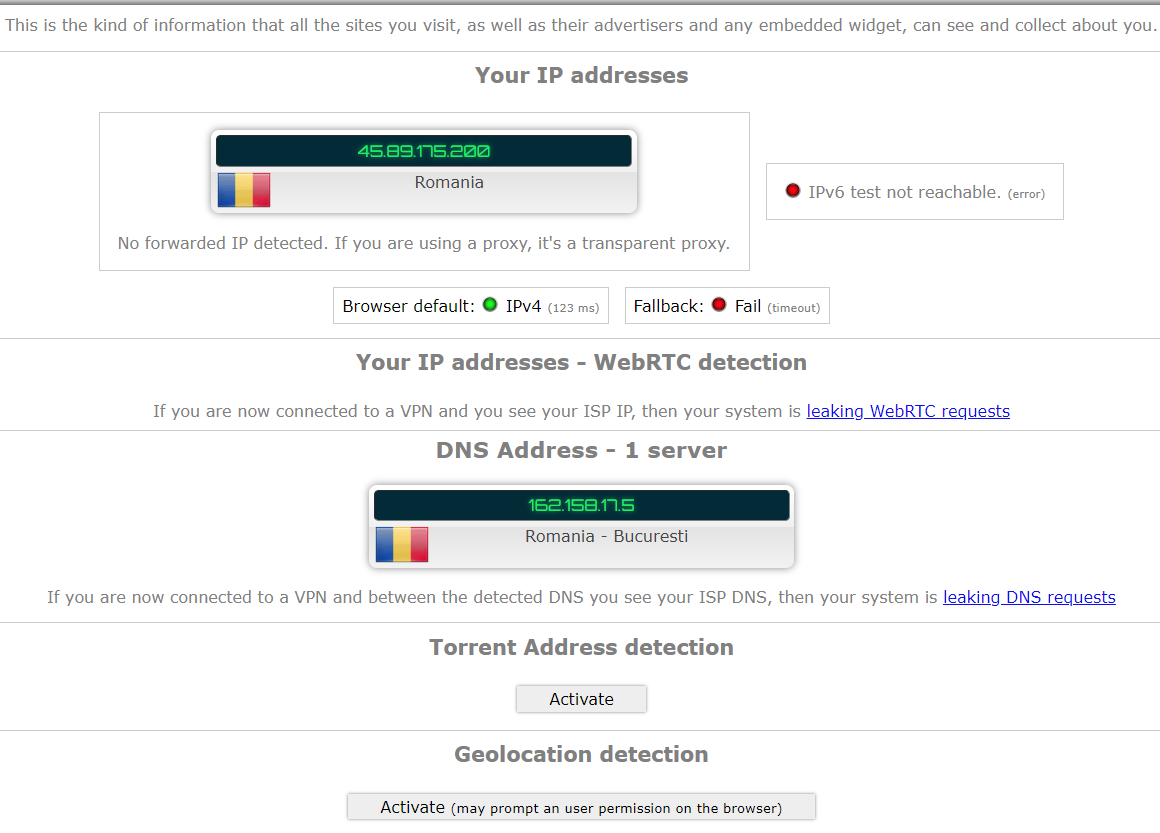
How to check if the VPN is working
The main goal of using a VPN is to have your data securely transmitted over the internet by keeping you anonymous. All VPN providers say that they do it but how can you be sure?
If you want to test out your VPN then you’re at the right place. Not all VPN providers keep their word and many security solutions are leaking your IP address and DNS requests.
In this article we will guide you through all the tests that you can do to verify of your VPN connection is protected from various types of leaks. We will test the VPN for:
- IP Leaks
- DNS leaks
- WebRTC leaks
- Speed tests
Seems a bit too technical? Well here’s a quick explanation on the tests that we will do.
IP leaks
Your IP address has a lot of information about you like your location, websites you visit, and operating browser (plus much more). When using a VPN, your IP address is masked with the VPN provider's IP address which protects your identity from snoopers. So if your original IP leaks then what’s the point of having a VPN?
DNS Leaks
Sometimes your IP address is hidden but your DNS address can also reveal your information like your location. The DNS server changes plain text URLs into IP addresses. If you’re not using a VPN then this process is handled by your ISP servers. So they will have direct access to see which websites you have accessed. If there’s a DNS leak, then anyone snooping on your traffic will be able to access that information.
WebRTS leaks
WebRTC or Web Real-Time Communications is built-in with most of the popular web browsers (like Firefox, Brave, Google Chrome, and Opera) which enables real-time communication. These include voice conversations, video chat but it presents some vulnerabilities when using a VPN. Some websites can use this feature to look past your VPN and discover your original IP address. Then they can provide or block content based on your real geo-location.
IP Leaks

While most VPN providers promise to protect your original IP address, in reality, it’s not the case. To test the status of your IP address go to our IP address test.
Note that it is necessary to test your VPN for IP address leaks when the VPN connection is active and when it is reconnecting to the internet. Most VPNs will leak your IP address while reconnecting to the internet.
So here are the steps you can take to test your VPN for leaks during reconnecting:
- Stay connected to your VPN and disconnect the internet (turn off WIFI or unplug the Ethernet cable)
- Now connect back to the internet. However, have multiple tabs of IP address testing webpages open and refresh each of them as quickly as possible.
- Once the VPN reconnects, stop refreshing and check the results.
- If your real IP address is seen in any of the tabs, then there’s a DNS leak.
If you don’t want any IP leaks get a reliable VPN provider.
DNS leaks
DNS stands for domain name system and basically translates domain names into IP addresses. However, sometimes the translation part leaks out of the VPN tunnel. This results in your original IP address along with your location exposed to the outside world.
To run a DNS leak test, simply connect to a VPN server located out of your country. There are a lot of sites out there to check for DNS leaks like DNS leak test but one of my favorites is the ipleak.net.

In this site, you can see your IP address and the DNS addresses. If you see any of your local DNS addresses, IP addresses, location, and other details matching to your ISP, then your VPN has a DNS leak.
Note that DNS leaks do not expose your IP address. It leaks the IP address and location of your Internet Service Provider which can be used to easily track your IP address.
WebRTC test
When your IP address leaks out via WebRTC APIs, a WeBRTC leak occurs and you can test it for yourself.
For Google Chrome, however, this comes with WebRTC enabled by default since Chrome 23 version. However to test if your VPN has leeks from WebRTC then try this test from perfect privacy.
To combat WebRTC leaks, use a browser that doesn’t have WebRTC. You can find the full list of browsers that exclude it on Wikipedia. Also disabling WebRTC from your browsers will result in no more leaks when using the VPN.
VPN Speed Test
While security and privacy is a major factor to consider when using a VPN, we can’t forget about the speed. If a VPN has extremely good protection but is slower than a snail (not considering turbo), then there’s no point in having it in the first place.
There are many factors that affect the speed of a VPNs speed, and here we will discuss the major tests that can be done. To learn in-depth about the internet speed while using a VPN have a read here.
ISP limitations
No matter how good your VPN would be if your ISP provides slower internet connections or you’re using a slower plan. The overall speed of the internet is controlled by your ISP.
Physical distance to the server
The physical distance that data has to travel plays a big role. To explain this phenomenon, check the pictures below.
This is my local network connection (Lithuania) speed.

Now the picture below is when I connect to our VPN server in New York.

As you can see there is a quite a big difference when moving through continents. Here’s another reference for you when I am connected to our VPN server in Germany.

Level of encryption
As the level of encryption increases, the speed of VPN begins to lower. OpenVPN protocol is more secure than PPTP protocol but has significantly lesser speed. If most of the tasks you do on the internet don’t need a high level of encryption. However we at VPN Surf use IKEv2 protocol which is the balanced protocol with the best speeds with the best security.
Number of active users on the VPN server
Many popular VPN service providers have their servers overloaded with users which results in slow speeds. Before investing on a VPN, make sure that they provide a server status page with real-time bandwidth information.
Conclusions
By now you know the basics of getting a VPN tested and check if it’s really worth it. There are many advantages of using a VPN so don’t rush into picking the ones out there without doing some testing.
If however you encounter any VPN leaks then you can contact the VPN providers support teams to try to fix it. If they won’t be able to fix the problem then move on to a quality VPN provider.
Let us know in the comments below if you found this helpful and if you know any new ways to test a VPN connection.
Do you value your privacy online?
Use VPN Surf and surf safely and securely in the open waters of the internet.
